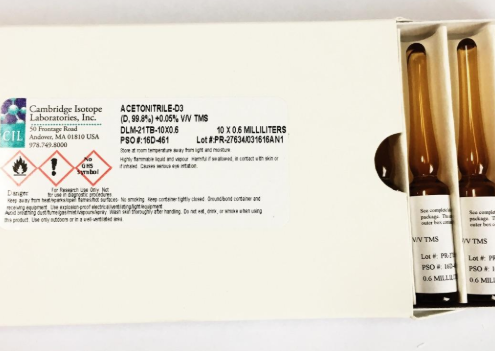Background and overview[1]
Deuterated acetonitrile is an organic solvent that can be used as an aprotic solvent for organic reactions. Deuterated acetonitrile is also an organic solvent used in NMR chromatography techniques.

Apply[1]
Deuterated acetonitrile can be used as an aprotic solvent for preparing benzimidazole cationic compounds and hydrogen. The method includes the following steps: 1) In a transparent reaction vessel (such as quartz or glass test tube), add dihydrobenzo An aprotic solvent with a dihydrobenzimidazole compound dissolved in an imidazole compound and an aprotic solvent or a protic solvent to obtain a concentration of 10-6 mol/l to a saturated solution, or to obtain a concentration of 10-6 mol/l to a saturated solution a protic solvent in which the dihydrobenzimidazole compound is dissolved; 2) adding an equivalent amount or an excess of an equivalent amount to the dihydrobenzimidazole compound to the aprotic solvent in which the dihydrobenzimidazole compound is dissolved obtained in step 1) Protic compound (this step is not required when using a protic solvent); 3) Pass an inert gas (argon, nitrogen, etc.) into the transparent reaction vessel containing the protic solvent in which the dihydrobenzimidazole compound is dissolved in step 1) in, or pass an inert gas (argon or nitrogen, etc.) into a transparent reaction vessel containing an aprotic solvent in which a dihydrobenzimidazole compound and a protic compound are dissolved in step 2); in the inert gas (argon gas or nitrogen) atmosphere, irradiate the transparent reaction vessel containing the protic solvent in which the dihydrobenzimidazole compound is dissolved in step 1) with ultraviolet light (200 nm < wavelength < 350 nm), or irradiate the container in step 2) There is a transparent reaction vessel with an aprotic solvent in which the dihydrobenzimidazole compound and the protic compound are dissolved; the illumination time varies with the concentration of the reactants, and thin layer chromatography and hydrogen nuclear magnetic resonance spectroscopy (1HNMR), ultraviolet-visible absorption spectrum or thermal conductivity-gas spectrum detection reaction is carried out to obtain the corresponding benzimidazole cationic compound and hydrogen gas.
The aprotic solvent is selected from acetonitrile, n-hexane, cyclohexane, benzene, toluene, dimethyl sulfoxide, deuterated acetonitrile, deuterated n-hexane, deuterated cyclohexane, deuterated benzene, deuterium At least one of the group consisting of toluene, deuterated dimethyl sulfoxide, etc.
Main reference materials
[1] CN200910243196.6 Method for preparing benzimidazole cationic compounds and hydrogen from dihydrobenzimidazole compounds

 微信扫一扫打赏
微信扫一扫打赏

